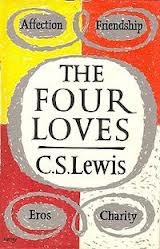The Question of God Part 6 (Freud segment–“Libido”; Lewis segment–“The Four Loves”; Conversation 6–“Love Thy Neighbor”)
In 1905 Freud wrote a series of essays on sexuality which associated sex— or libido — as the driving force of our desires and impulses. More significantly, he claimed this drive formed very early in childhood. Viennese society was scandalized. “What is more natural than that we should persist in looking for happiness along the path on which we first encountered it?” Freud wrote. “Sexual love has given us our most intense experience of an overwhelming sensation of pleasure and has thus furnished us with a pattern for our search for happiness.”
Freud claimed that sexuality began at birth, not puberty. He was accused of violating the innocence of childhood. But for him, bringing repressed sexual desires into conscious understanding through analysis makes it possible to obtain a mastery over them. “It can be said, Freud wrote, “that analysis sets the neurotic free from the chains of his sexuality.” Freud’s “liberation” of human sexuality, while scandalous at the time, gave birth to the “sexual revolution” that was a defining part of 20th century social development. In the wake of Freud’s ideas came Alfred Kinsey’s infamous reports on human sexuality, the “swinger society” and “free love” counter-culture of the sixties, and GLBT “outing” and social activism that has transformed sexual boundaries from the seventies to the present.
In 1963 Lewis published The Four Loves, a book which identified four ways in which human beings express and experience love. He identified each with a particular Greek word for love (transliterated into English here)
- Storge love describes the affection that comes through familiarity, particularly between family members. It is the most widely diffused and uncoerced of the loves, naturally present as a kind of “built-in” aspect of the human condition. It is a love that flows regardless of the perceived “value” of loves object, and most able to transcend discrimination.
- Philia love describes bonds of friendship that form around common experiences, interests, or activites shared by people. It is the least natural of the loves because it requires the presence of something for friendship to “be about.” But for Lewis (as well as for the Classical culture he embraced), it was the most admirable of loves because it looked not at the loved, but at the “about,” for its value.
- Eros is love in the sense of “being in love” emotionally. Lewis distinguishes eros from pure sexuality (which he identified as “venus”). Although it does find expression through sexual activity, eros also involves a spiritual dynamic that transcends mere “animal lust.” Lewis notes that eros is the source of the tragic in history and literature, and he warns against its elevation to godlike status by idolatry.
- Agape (also identified as charis/caris, translated “charity” in many Bibles) is a love directed toward one’s neighbor which does not depend on any “loveable” qualities of either the object or circumstances of the love process. Lewis recognizes this as the greatest of the loves, and he sees it as a specifically Christian virtue. All the other “natural” loves, Lewis thought, must be subordinated to the agape love of God and expressed with Christian charity. God’s love acts on our natural loves as the sun and rain act on a garden; without either the object of our love would cease to be beautiful or worthy.
Only agape love, Lewis believed, allows us to unconditionally “love our neighbors” as the Bible commands. All the other “loves” are contingent upon some “valuing” of the object of love. Freud says that human beings have always been internally in conflict between insatiable personal desires and the social prohibitions imposed upon us by family and community expectations. Our inability to properly reconcile these tensions results in psychological, physiological, and social disease and dysfunction.
Learn more about Love, Sexuality and the Human Story—C. S. Lewis, The Four Loves (originally published in 1963; Harvest ed. 1998); Judith and Jack Balswick , Authentic Human Sexuality (2nd Ed, IVPress, 2008).

